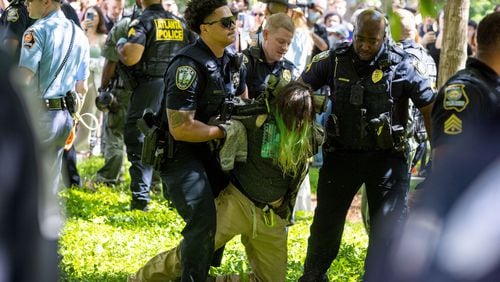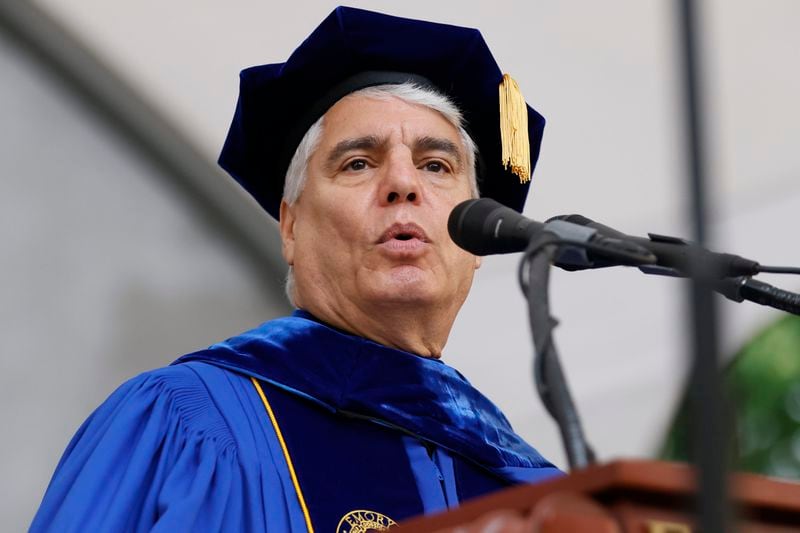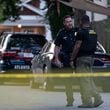Clarification: This article has been updated to explain the number of people who’ve died in the Israel-Hamas war.
It all changed quickly on the spacious Emory University campus quad shortly after sunrise Thursday morning, student Bella Montealegre recalled.
“(We were) mostly just chanting, dancing, etcetera and then all of a sudden, I see, like, dozens of police officers come from (the north) side of the campus,” Montealegre remembered in an interview.
Cheryl Elliott, Emory’s vice president for public safety, said some individuals pushed past campus police officers stationed on the quad and set up tents as part of a protest in an area where equipment and materials were staged for the upcoming commencement. Atlanta police and Georgia State Patrol officers were called to assist. Elliott said authorities gave multiple warnings before taking action.
Montealegre said that’s not what she saw.
“I was right there in the front, and they just threw tear gas and it went right in my face and a lot of my peers’ (faces) as well,” she said.
The campus was soon in chaos. A faculty member who yelled at police was taken to the ground and handcuffed. Troopers deployed pepper balls to control the crowd. About two dozen people, mostly Emory students, were arrested.
After months of mounting tension at the Atlanta school about differing viewpoints concerning the Israel-Hamas war, Thursday’s confrontations and arrests stunned the Emory campus. Emory is now among the large list of colleges and universities nationwide that has had arrests in recent weeks in response to protests about the war. Promises of more protests, concerns about student safety and discrimination and calls for the removal of President Gregory L. Fenves will likely define the last weeks of the semester ahead of the May 13 commencement ceremony on campus.
The actions of law enforcement will be another area of focus. Atlanta Mayor Andre Dickens said city police are reviewing body-worn camera footage to determine if officers made any policy violations. An attorney representing three of the protesters and several state lawmakers have questioned the tactics used by Georgia State Patrol.
Tara Doyle, a senior lecturer and research fellow at Emory’s Candler School of Theology, comforted groups of upset students shortly after the arrests. She said she was “ashamed” of Emory’s response to the protest.
“These are our kids,” she said, clearly frustrated. “This is our campus.”
The mounting tension
Since the Israel-Hamas war began in October, Emory University has been the epicenter of debate and demonstrations about the conflict in Georgia. There was a vigil in support of Israel a few days after the surprise Hamas attack that killed an estimated 1,200 Israelis and foreigners. A Palestinian American assistant professor in its medical school was put on leave a few weeks later after the university became aware of “antisemitic comments” attributed to the faculty member. Emory later announced that the professor was no longer employed by the university.
With about 15,000 students, Emory, nestled in Atlanta’s tony Druid Hills neighborhood, has the largest student body of any private university in Georgia. Known for its prestigious medical research programs and acclaimed law school, Emory is often ranked among the nation’s top academic universities.
Founded nearly two centuries ago by the Methodist Episcopal Church, Emory prides itself on celebrating its diversity. Nearly 20% of its undergraduate enrollment is Jewish, according to the Anti-Defamation League.
In the last month, two men were arrested after a protest outside Chabad at Emory, a place that provides educational, social and other forms of support for Jewish students. Two civil rights groups filed a federal complaint against Emory, accusing the school of allowing anti-Palestinian, anti-Arab and Islamophobic discrimination.
As more Palestinians have been killed in the conflict — two-thirds of the estimated 34,000 children and women — protests demanding a ceasefire and an end to the conflict have increased on many U.S. college campuses.
Many of the biggest demonstrations have been at private colleges and universities with large endowments, like Emory. The demands by protesters at several schools have been the same: cut ties to any financial interests involving Israel. A recent strategy to get results has been encampments. The most prominent encampment has been at Columbia University in New York City, where more than 100 people were arrested earlier this month. The strategy has gone global: Students in Paris started an encampment there, inspired by what they’ve seen in the United States.
Thursday’s protest at Emory was billed as a pro-Palestinian rally and a demonstration opposing the public safety training center for Atlanta police and fire rescue personnel. A group at Emory opposed to the center has regularly hosted protests and rallies lobbying against it.
It is worth watching this CNN video from the moment Emory Econ Professor @CarolineFohlin came across the violent arrest of a protester on campus and asked the police, with shock, "What are you doing?" That's all that prompted an officer to hurl her to the ground and handcuff her. https://t.co/QKNRqOoIiS pic.twitter.com/uYpXwKuc8D
— Robert Mackey (@RobertMackey) April 26, 2024
Emory student Alex Valdivia came to the encampment to see what was going on. He said he wasn’t planning to protest, but said he was surprised when officers swept into the quad. He said the university responded differently last year to similar protests against the training center, which happened in the same campus vicinity.
“There were only … five or six police officers up until this swarm happened (where there) were 40 maybe on each side (of the quad),” he said.
Some faculty members spoke Thursday shortly after the arrests, praising students for not backing down and criticizing Emory administrators for calling in additional officers.
“I’m here in solidarity with you and … outraged in the way that this campus has been militarized in response to a peaceful protest,” said philosophy professor Lynne Huffer. “President Fenves sent out an email saying it was outside agitators (protesting). I stand in solidarity and am so glad to see you all taking back power.”
Increasing scrutiny of Emory’s president
Fenves, Emory’s president since 2020, is facing growing criticism about the university’s response. There were chants that he should resign during Thursday’s demonstrations. On Friday, the faculty senate for the Emory College of Arts and Sciences agreed during a meeting to hold a college-wide no confidence vote in Fenves. Two online petitions urging him to leave had a combined 2,200 signatures by Saturday. Emory’s American Association of University Professors chapter said in a statement in part the core mission of a university lies in unfettered inquiry facilitated by open and vigorous debate. The statement condemned Emory’s “failure to uphold this responsibility.”
Fenves wrote a message to the Emory community Friday that said he was upset by Thursday morning’s arrests. The university’s first Jewish president, Fenves, the son of a Holocaust survivor, said he recognized the fierce debates about the war “stir painful emotions” and the construction of the Atlanta Public Safety Training Center “engenders fierce debate across our city.” But he said Emory would not tolerate vandalism and violence, saying some protesters pinned police officers against the glass doors of the Candler School of Theology and threw objects at them during a demonstration Thursday evening. No arrests were made.
Credit: Miguel Martinez
Credit: Miguel Martinez
Meanwhile, Jewish student groups in the Atlanta area and nationally are increasingly worried about antisemitism on campuses and the safety of students. Hillel recently released a call to action for college presidents to enforce their codes of conduct, restrict access of those who may incite violence or discrimination and better plan for campus disruptions.
Demonstrations took place last week at Kennesaw State University. There have been calls for demonstrations at the University of Georgia and at Morehouse College, which is preparing to host President Joe Biden as its commencement speaker. Pro-Palestinian activists have complained Biden hasn’t done enough to stop the deaths of civilians in the war.
State officials have responded along party lines to the events at Emory. Republican Lt. Gov. Burt Jones decried “pro-terrorist radicals and liberal anarchists” at Georgia campuses. Meanwhile, several Democrat state lawmakers have come out in defense of the right to protest. The arrests were “bad management and (the) result of bad decisions,” state Rep. Mary Margaret Oliver, whose district includes Emory, wrote Friday.
In addition to the hundreds of arrests that have taken place at colleges and universities across the country, some schools have gone a step further: The University of Southern California canceled its main graduation ceremony over concerns about protests. Emory University officials did not have an update about commencement, a spokeswoman said Friday.
Fenves said near the conclusion of his letter that Emory staff were repairing damage to the quad and other employees are preparing for commencement. He said he recognizes the coming days may be difficult.
“As we approach finals, the end of the academic year, and Commencement, I recognize that there is disagreement on difficult issues and there will continue to be debate,” Fenves said in his message to Emory. “But I also know we can express our views and beliefs without diminishing the experiences and accomplishments of others. That will be our challenge in the days ahead and I know it is one that this community will rise to meet.”
— Staff writer Riley Bunch contributed to this article.










